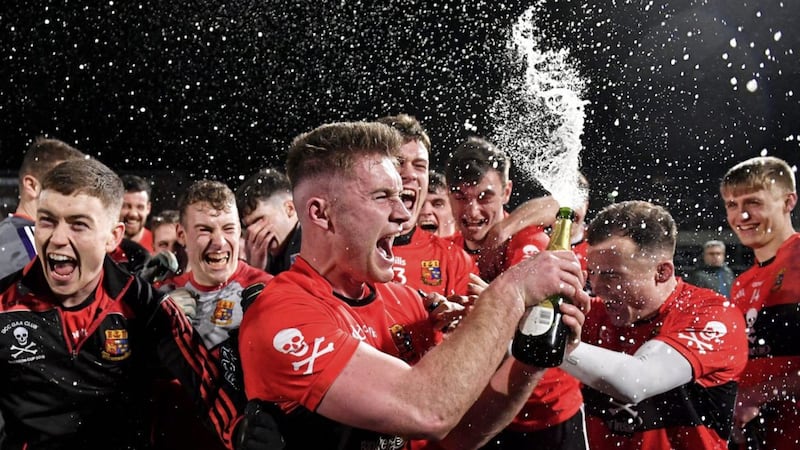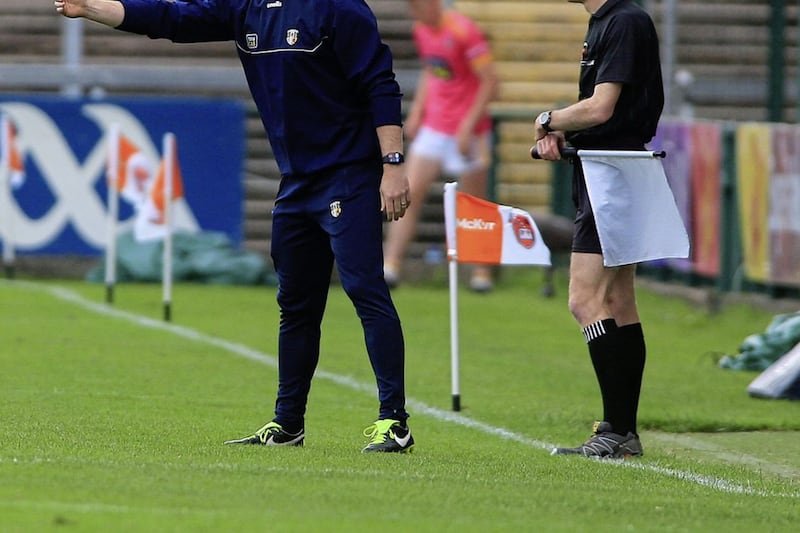THE merits of the Sigerson and Fitzgibbon Cup competitions have come under the spotlight again this month with their disruption of inter-county activities.
As ever, the much-maligned GAA fixtures calendar is being blamed as the problem child, but perhaps it is the inter-county bully at it again.
For a long time, it has been the GAA’s favourite son and, while the association tries to placate its other children by pouring sugary syrup into their ears with kind words about ‘grassroots’ and ‘cornerstones’, the ongoing dominance of the inter-county game tells a more accurate story.
The Sigerson Cup is a historically prestigious competition of the GAA and one that I was lucky enough to win as part of a Jordanstown side under the great Adrian McGuckin in 2000/01.
Ironically, that was a year its format was messed up with the ‘foot-andmouth’ outbreak, but generally it was run via qualifier rounds followed by a final play-off weekend.
The Sigerson Cup weekends were a unique highlight of any young footballer’s career, creating both memories and friendships that could last a lifetime. Unfortunately, as the calendar has modernised, the classic weekend format has been lost.
More recently, the third level teams have also lost out on their involvement in the provincial pre-season inter-county competitions like the McKenna Cup.
While their participation in those did always have a square peg in a round hole feel, it nonetheless brought benefits such as giving young players opportunities to test (and hopefully prove) themselves at inter-county level while also increasing awareness and prestige of the university teams.
The arrangement, however, never gained the support of the intercounty managements who found their players torn between two teams and it has now come to its inevitable end. On top of these hits, the Sigerson has also lost its ideal springtime berth and is now played off in January.
The January slot is not perfect from a university perspective as it means trying to gather up players from around the country for training over the Christmas period while January is also the exam period.
The reason given for the switch to January was to facilitate the creation of the club month of April.
Of course, that is not entirely true.
The Sigerson Cup was never played in April. It had to be moved from its spring slot because the GAA knew suggesting it remaining there and played during the condensed NFL campaign would not be accepted by inter-county teams.
Now, having put up with all of this, it finds itself somehow feeling unwelcome again. In the past few weeks we have witnessed teams unable to field as they don’t have access to their talented 19-23-year-olds while having an entire county to choose from; inter-county managers suggesting the Sigerson should be moved to December as this would free the calendar up and help the players with exam pressures in January (apparently forgetting that making the players travel for county training and McKenna Cup games in January is hardly better in this regard than training locally at their university).
Elsewhere, players were made to travel for an inter-county teams fitness test despite having a Sigerson Cup game the next day.
The same people who argue that they need full access to all these players in January to properly prepare for the National League and require several weeks of full training attendance to prepare for Championship, baulk at the thought of the same players’ attendance at club training or especially club challenge games as the clubs themselves try to prepare for leagues and championships.
They are further examples of how the activity of inter-county teams increasingly dictate everything around them.
At this rate, the once-great Sigerson Cup is at risk of following the Railway Cup into the history books.
THE forces being applied to competitions to try and achieve formats which fit in the calendar are significant and only increasing due to the ever-growing influence of the inter-county game.
The Sigerson Cup may not attract big numbers in terms of support or widespread public interest, but it does bring very tangible benefits for players which must not be overlooked.
Third level institutions’ embrace of all things GAA has led to widespread roll-out of scholarship and bursary opportunities for many young players.
Yes, it may still be elitist, but facilitating increased education opportunities with the lifelong benefits they can bring has definite appeals in an age where the debate of semi-professionalism or pay for play refuses to go away.
Suffocating the life out of competitions like the Sigerson or diminishing them by ensuring the best players are not involved will eventually kill them off to the extent that universities will no longer be able to support the current schemes and become much less interested in our games.
Anyone who is a regular reader of this column will know that I am far from anti-inter-county.
I fully believe in the central importance of the inter-county game in the association and believe it deserves its degree of pre-eminence given the considerable promotion, excitement and financial benefits it brings the game.
I also can fully understand the pressure on the inter-county managers to produce the goods.
They live in a goldfish bowl where everyone is looking in and commentating and they are the ones responsible for results.
If I was in that position, I would run my team on as professional a basis as I could just for the feeling that I had done everything possible come the ball being thrown in.
Yet, the current levels of pressure being exerted on players, on the fixtures calendar and, financially, on county boards by the increased demands of the inter-county game have not been reflected by an improved game or indeed any other benefits.
In fact, one could argue it has had the opposite impact.
It may feel counter-intuitive to take a step back from advancement, back from the relentless push for being as good as we possibly can, but when that push and relentless stepping forward is trampling everything around it to achieve greater heights of athletic performance then maybe it is right, in the case of our amateur game anyway, to pause, reflect and change course.
It was refreshing to see Antrim manager Lenny Harbinson talk about a very measured training schedule, but I am sure that Antrim are an anomaly in that regard. Given that no team should be expected to step back from the relentless increase in preparation levels when all their opponents are taking two steps forward means any change can only occur if led centrally by the GAA.
It would be a massive and difficult step to achieve, but it might just take that sort of drastic action to have the kind of impact it increasingly looks is needed. One thing is for sure, continuing to sideline the likes of the Sigerson Cup is not the right path.






